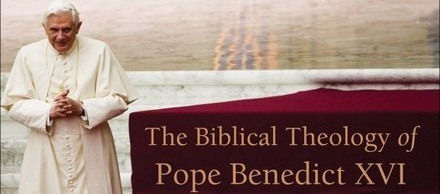
In some ways it seems like yesterday I was hailing—in this very column—the election of Cardinal Joseph Ratzinger as supreme pontiff of the Church.
I noted that he was the first world-class biblical theologian to be elevated to the papacy. I observed that he was probably the first pope since St. Peter to be so steeped in the doctrine of the ancient rabbis.
It seems like yesterday, but it’s actually been more than four years, and those have been years rich in teaching. And all the claims I made in that long-ago column has been confirmed—infallibly!
Perhaps more than any other theologian in his time, Pope Benedict has proposed a biblical theology that combines modern scientific methods with the Church’s tradition of spiritual reading, methods that began with the New Testament writers and continued in the work of the Church Fathers.
This biblical orientation is arguably the keynote of his life’s work. Yet it has been largely ignored by scholars, who prefer to consider the man in relation to the great controversies of his lifetime. So we often find analysis of his positions on liturgy and politics, for example, but no clear sense of the biblical bases for those positions.
If you’ve heard me speak, you’ve probably heard me make these points. Now, however, I’m pleased to announce that I’ve made my case in a book, Covenant and Communion: The Biblical Theology of Benedict XVI. Its out this month from Brazos Press, a scholarly imprint of Baker Books. (Baker is, by the way, one of the leading Evangelical publishing houses in the United States.)
Its the first book to consider the great and common theme in Benedicts published work, from the time of his doctoral dissertation to his recent Wednesday audiences. All of his thinking has been shaped by the biblical story, the unfolding of salvation history in Scripture, from Genesis through Revelation.
Quietly and modestly, he has proposed some radical notions. He holds that the human authors of Scripture Matthew, Mark, Luke, John, Peter, Paul and so on should be models for the work of theology. They are, he argues, the normative theologians.
Decades ago, he called for a critique of criticism the corrosive, but very fashionable methods of analyzing Scripture. Benedict pointed out the absurdity of using critical methods uncritically reducing the biblical texts to mere data, while promoting modern philosophical notions as dogma. He concluded that biblical interpretation and theology, when done apart from the Church, lead to a denial that Jesus is the Christ. Exclusive reliance on the historical-critical method, he said, has resulted in widespread ignorance about the true nature, identity, and mission of Christ.
Do you recognize that ignorance? Havent we seen and heard too much of it in popular Catholic writing and preaching? Doesnt the Church deserve better than that?
Pope Benedict thinks so. Building on the work of both modern and ancient philosophers, he demonstrates that faith is a way of knowing, and that faith enables us to interpret the Bible in a way thats far more reliable than any passing academic fads.
He guides us to a truly Catholic way of understanding Scripture, and a truly scriptural way of understanding Catholic doctrine. In words that moved me and will move you deeply he speaks of the sacramental liturgy as the climax of salvation history and the embrace of salvation.
Since long before his papacy and even before I became a Catholic! this man has exercised a powerful influence on me. I dont exaggerate when I say that the work of the St. Paul Center, the work you support with your prayers and contributions, would be unthinkable without him.
This book is the first installment in the debt I owe him and the debt I owe you for your kindnesses. Please let me know what you think of it.